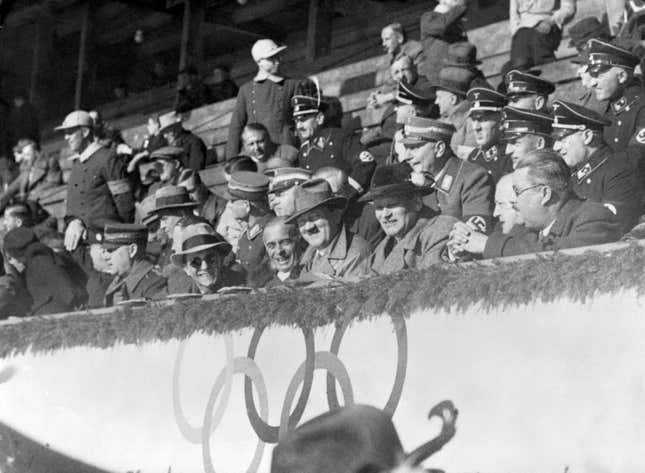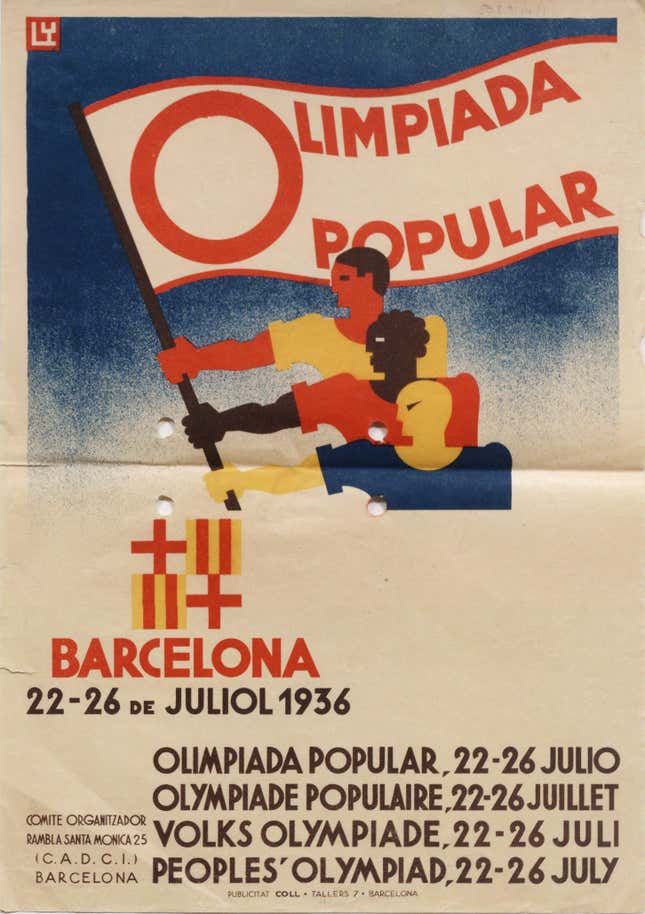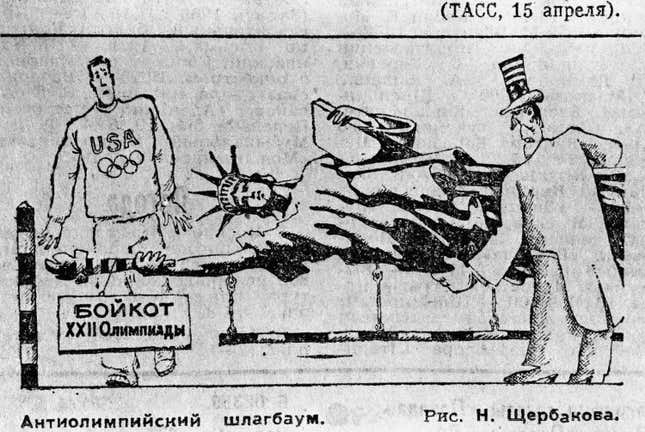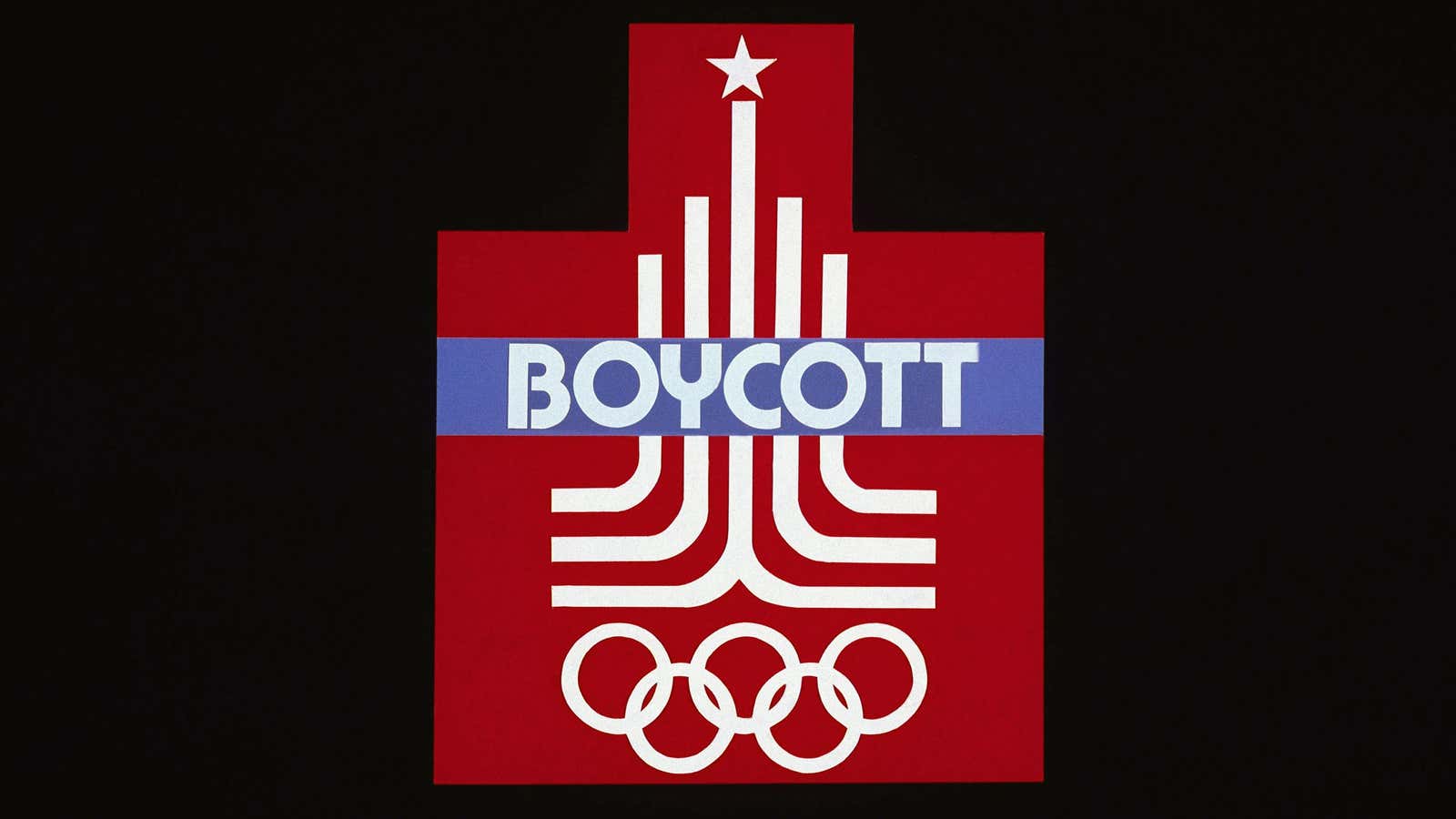The 2016 Olympic Games kick off in earnest in Rio today (Aug. 5), without a host of Russian athletes. Although Russia will be officially represented at the Games, nearly a third of its original team is banned due to a state-sanctioned doping scandal.
All things considered, however, it will be a very well-attended Olympics. Boycotts and bans have been common throughout the history of the Games, as have alternative competitions organized by countries that refused or weren’t invited to participate in the main event. Here is a small selection…
Antwerp 1920
Who didn’t go: 🇦🇹 🇧🇬 🇩🇪 🇭🇺 🇹🇷 [🇷🇺 Soviet Russia]
Antwerp was chosen to host the Games as a consolation to Belgium, which was devastated during World War I. The defeated countries—Austria, Bulgaria, Germany, Hungary, and Turkey—were not invited. The nascent Soviet federation also chose not to attend, and boycotted the Games for decades to come.
What they did instead: Workers’ Olympiads and Spartakiads
Dismissing the Olympics as a tool of the privileged upper classes, the eschewed countries founded their own International Workers’ Olympiads, which weren’t just for top athletes but encouraged mass participation. In Russia, these became known as “Spartakiads” (after the rebel gladiator Spartacus). Various editions of the games were held between 1921 and 1937.
The Socialist Worker describes quite the scene at the finale of 1931 event in Vienna:
On the last day of the Olympiad some 250,000 people came to watch the “festive march” through Vienna of an estimated 100,000 people from 26 nations. They toppled a symbolic figure that represented capitalism.
Berlin 1936

Who didn’t go: 🇪🇸 [🇷🇺 Soviet Union]
Spain and the Soviets boycotted the Games organized by the Nazi regime. Adolf Hitler was a prominent host, using the spectacle as a means to promote his ideas about Aryan racial supremacy. These dubious notions crumbed as American runner Jesse Owens won gold after gold. The Führer also tried to ban any athletes of Jewish ancestry, but relented when widespread boycotts were threatened. Germany excluded all of its own Jewish athletes, except fencer Helene Mayer, who won a silver in mysterious circumstances.
What they did instead: The People’s Olympiad

Spain organized its own Games, the People’s Olympiad, in Barcelona. Soviet athletes and others from various trade unions signed up. However, the event was cancelled at the last minute because of the outbreak of the Spanish Civil War.
London 1948
Who didn’t go: 🇩🇪 🇯🇵 [🇷🇺 Soviet Union]
After the Berlin Games, World War II put the Olympics on hiatus for 12 years. In London in 1948, Germany and Japan were not allowed to send athletes. The Soviet Union was invited but once again didn’t show, with Joseph Stalin not appreciating the Games as a propaganda tool (he came around in 1952).
What they did instead: More Spartakiads
Although the Soviet Union joined the Olympics in Helsinki in 1952, it also revived the Spartakiads, recast as national competitions among the Soviet peoples, in the mid-1950s and kept them going up until 1990.
Melbourne 1956
Who didn’t go: 🇪🇬 🇱🇧 🇮🇶 🇳🇱 🇪🇸 🇨🇭 🇨🇳 and 🐎
Seven countries didn’t make it to the Games in the Southern Hemisphere. Egypt, Iraq, and Lebanon refused to participate in response to the Suez Crisis. The Netherlands, Spain, and Switzerland boycotted the Games as a protest against the Soviet invasion of Hungary. China withdrew shortly before the opening ceremony because Taiwan was allowed to compete.
What they did instead: Stockholm equestrian events
Foreign horses weren’t allowed in Melbourne, due to Australia’s strict quarantine rules. The equestrian events were instead held at a stadium in Stockholm months before the main competition began down under.
Montreal 1976
Who didn’t go: 🇿🇦 🇩🇿 🇨🇲 🇨🇫 🇨🇩 🇨🇬 🇪🇬 🇪🇹 🇬🇦 🇬🇲 🇬🇭 🇬🇾 🇮🇶 🇰🇪 🇱🇾 🇲🇬��🇲🇼 🇲🇱 🇲🇦 🇳🇪 🇳🇬 🇸🇩 🇸🇿 🇹🇿 🇹🇬 🇹🇳 🇺🇬 🇿🇲 🇧🇫
Nearly 30 African countries took part in a last-minute boycott, refusing to compete alongside New Zealand, whose national rugby team went on a controversial tour in apartheid South Africa (itself banned from the Olympics between 1964 and 1992). Taiwan also opted out because the Canadian government refused to allow them to participate as the “Republic of China.”
What they did instead: Went home
Athletes from most of the countries that boycotted the Games were already in Montreal when the decision was made to shun the competition. Kenya pulled out mere hours before the opening ceremony.
Moscow 1980
Who didn’t go: 🇦🇱 🇦🇬 🇦🇷 🇧🇸 🇧🇭 🇧🇩 🇧🇧 🇧🇿 🇧🇲 🇧🇴 🇨🇦 🇰🇾 🇨🇫 🇨🇱 🇨🇳 🇨🇮 🇪🇬 🇸🇻 🇫🇯 🇬🇦 🇬🇲 🇬🇭 🇭🇹 🇭🇳 🇭🇰 🇮🇩 🇮🇷 🇮🇱 🇯🇵 🇰🇪 🇰🇷 🇱🇷 🇱🇮 🇲🇼 🇲🇾 🇲🇦 🇲🇷 🇳🇪 🇳🇴 🇵🇰 🇵🇦 🇵🇬 🇵🇾 🇵🇭 🇶🇦 🇸🇦 🇸🇬 🇸🇴 🇸🇩 🇸🇷 🇸🇿 🇹🇭 🇹🇬 🇹🇳 🇹🇷 🇦🇪 🇺🇸 🇺🇾 🇻🇮 🇩🇪 🇨🇩
The Moscow Games saw the biggest boycott in the history of the Olympics, with more than 60 countries refusing to compete. US president Jimmy Carter led the boycott in protest of the Soviet invasion of Afghanistan. Some countries, like Britain and France, supported the boycotts but still sent athletes to Moscow to compete under the Olympic flag.
What they did instead: The Liberty Bell Classic

The Liberty Bell Classic was held at the University of Pennsylvania in Philadelphia, with a few hundred athletes from around half of the boycotting countries participating. Sports Illustrated bemoaned “the low caliber of competition and the uninspiring setting” of the event at the time.
Los Angeles 1984
Who didn’t go: 🇧🇬 🇩🇪 🇲🇳 🇻🇳 🇱🇦 🇨🇿 🇸🇰 🇦🇫 🇭🇺 🇵🇱 🇨🇺 🇰🇵 🇪🇹 🇦🇴 🇾🇪 🇦🇱 🇮🇷 🇱🇾 [🇷🇺 Soviet Union]
In retaliation for the western boycotts in 1980, the Soviet Union and 14 other socialist countries stayed home during the 1984 Games, refusing to send their athletes to Los Angeles under the pretense of “safety concerns.”
What they did instead: The Friendship Games
The Eastern Bloc also hosted its own alternative Olympics. Instead of joining the Games in Los Angeles, the Soviet Union and other socialist countries organized the Friendship Games. Some non-boycotting countries also sent athletes who didn’t qualify for the LA Games to the event in Moscow instead.
Rio 2016
Who isn’t going: 🇷🇺 (partially)
When accusations of state-sanctioned doping were first leveled at Russia by international anti-doping officials, it looked as if Russia could have been banned from the Rio Games entirely. It’s not as bad as that, although all but one Russian track-and-field athlete has been barred from Brazil.
What they are doing instead: International Army Games
As history shows, Russia always has a back-up plan when things at the Olympics go awry. This year, local media have given a lot of attention to the revived International Army Games, which began recently and will run for a few more weeks. The event features more than 3,000 military personnel from 19 countries. It’s like the Olympics, but with more tanks.
